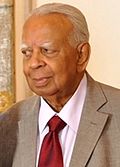2020 Sri Lankan parliamentary election: Difference between revisions
No edit summary |
No edit summary |
||
| Line 12: | Line 12: | ||
| next_mps= |
| next_mps= |
||
| seats_for_election = All 225 seats to the [[Parliament of Sri Lanka]] <br /> 113 seats are needed for a majority |
| seats_for_election = All 225 seats to the [[Parliament of Sri Lanka]] <br /> 113 seats are needed for a majority |
||
| election_date = |
| election_date = March 2020 |
||
| turnout = |
| turnout = |
||
| Line 85: | Line 85: | ||
| after_party = |
| after_party = |
||
}} |
}} |
||
'''Parliamentary elections in Sri Lanka''' are scheduled to be held in |
'''Parliamentary elections in Sri Lanka''' are scheduled to be held in March 2020. |
||
In November 2018, the date was briefly moved forward by more than a year to 5 January 2019 due to President [[Maithripala Sirisena]] dissolving parliament during a [[2018 Sri Lankan constitutional crisis|constitutional crisis]] and calling for a snap election.<ref name="parliamentdissolved">{{cite news |last1=Bastians |first1=Dharisha |last2=Goel |first2=Vindu |title=Sri Lanka President Dissolves Parliament Amid Power Struggle |url=https://www.nytimes.com/2018/11/09/world/asia/sri-lanka-dissolves-parliament.html |accessdate=26 November 2018 |work=New York Times |date=9 November 2018 }}</ref> The Supreme Court later suspended the dissolution and ordered a halt to the snap election, effectively moving the election's date back to 2020.<ref>{{cite news |title=Sri Lanka Supreme Court overturns dissolution of parliament |url=https://www.aljazeera.com/news/2018/11/sri-lanka-supreme-court-overturns-dissolution-parliament-181113125340789.html |accessdate=26 November 2018 |agency=Al Jazeera and news agencies |date=13 November 2018}}</ref> |
In November 2018, the date was briefly moved forward by more than a year to 5 January 2019 due to President [[Maithripala Sirisena]] dissolving parliament during a [[2018 Sri Lankan constitutional crisis|constitutional crisis]] and calling for a snap election.<ref name="parliamentdissolved">{{cite news |last1=Bastians |first1=Dharisha |last2=Goel |first2=Vindu |title=Sri Lanka President Dissolves Parliament Amid Power Struggle |url=https://www.nytimes.com/2018/11/09/world/asia/sri-lanka-dissolves-parliament.html |accessdate=26 November 2018 |work=New York Times |date=9 November 2018 }}</ref> The Supreme Court later suspended the dissolution and ordered a halt to the snap election, effectively moving the election's date back to 2020.<ref>{{cite news |title=Sri Lanka Supreme Court overturns dissolution of parliament |url=https://www.aljazeera.com/news/2018/11/sri-lanka-supreme-court-overturns-dissolution-parliament-181113125340789.html |accessdate=26 November 2018 |agency=Al Jazeera and news agencies |date=13 November 2018}}</ref> |
||
Revision as of 02:25, 1 December 2019
| |||||||||||||||||||||||||||||||||||||||||
All 225 seats to the Parliament of Sri Lanka 113 seats are needed for a majority | |||||||||||||||||||||||||||||||||||||||||
|---|---|---|---|---|---|---|---|---|---|---|---|---|---|---|---|---|---|---|---|---|---|---|---|---|---|---|---|---|---|---|---|---|---|---|---|---|---|---|---|---|---|
| |||||||||||||||||||||||||||||||||||||||||
| |||||||||||||||||||||||||||||||||||||||||
Parliamentary elections in Sri Lanka are scheduled to be held in March 2020.
In November 2018, the date was briefly moved forward by more than a year to 5 January 2019 due to President Maithripala Sirisena dissolving parliament during a constitutional crisis and calling for a snap election.[1] The Supreme Court later suspended the dissolution and ordered a halt to the snap election, effectively moving the election's date back to 2020.[2]
Background
During the constitutional crisis, Sirisena dissolved parliament and ordered a snap election after his nominee for Prime Minister, Mahinda Rajapaksa, failed to gain a majority in Parliament to back his nomination.[1]
However, after the constitutionality of the dissolution was challenged before Sri Lanka's Supreme Court, the dissolution was suspended, and the snap election was put on hold while the court case was ongoing. On 13 December 2018, the Supreme Court ruled the dissolution of the parliament unconstitutional, moving the election back to its original date.[3]
Electoral system
196 MPs were elected from 22 multi-member electoral districts using the D'Hondt method with an open list, a proportional representation system.[4][5] The remaining 29 seats were allocated to contesting parties and independent groups in proportion to their share of the national vote.[6][7]
Notes
References
- ^ a b Bastians, Dharisha; Goel, Vindu (9 November 2018). "Sri Lanka President Dissolves Parliament Amid Power Struggle". New York Times. Retrieved 26 November 2018.
- ^ "Sri Lanka Supreme Court overturns dissolution of parliament". Al Jazeera and news agencies. 13 November 2018. Retrieved 26 November 2018.
- ^ Rasheed, Zaheena; Kuruwita, Rathindra (13 December 2018). "Sri Lanka's Supreme Court overturns sacking of parliament". Al Jazeera. Retrieved 14 December 2018.
- ^ Blanc, Jarrett; Hylland, Aanund; Vollan, Kare (2006). State Structure and Electoral Systems in Post-Conflict Situations. International Foundation for Electoral Systems. p. 106. ISBN 1-931459-17-7.
- ^ "Report of the Post-Election Assessment of Sri Lanka Mission: November 28 – December 2, 2000" (PDF). National Democratic Institute for International Affairs. 28 December 2000. p. 10.
- ^ Thilakarathne, N. M. C. (1997). "Parliament Library of Sri Lanka". In Brian, Rob (ed.). Parliamentary Libraries and Information Services of Asia and the Pacific: Papers prepared for the 62nd IFLA Conference Beijing, China August 25–31, 1996. Walter de Gruyte. p. 87. ISBN 3-11-094763-3.
- ^ "Sri Lanka: Parliament". Inter-Parliamentary Union.
External links



